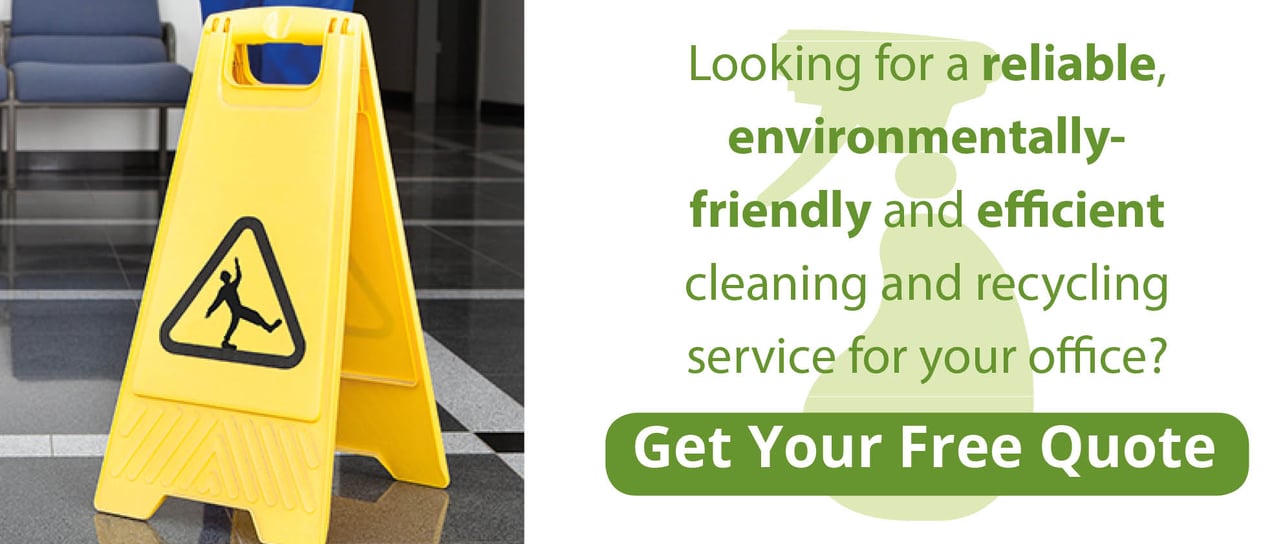Why Is Infection Control Important In The Workplace?
Workplaces can be natural breeding grounds for germs and the spread of infection.
You have a large number of people in an enclosed space for hours each day. The temperature is kept at a comfortable 22 degrees, which is also prime conditions for the growth of bacteria. Everyone touches the same door handles and shares equipment like photocopiers. There’s shared furniture, cutlery and crockery in break areas.
When you consider all these factors together, it’s no surprise that infections can spread quickly in a workplace environment.
This is where infection control becomes important.
By taking a proactive approach to address infections in the workplace, you can improve the health of your employees and minimise the business impact of widespread illness.
In this article we'll break down what infection control means, why it's crucial in the workplace, and suggest some simple ways to put it into action.
What is infection control?
Explained simply, infection control is all about taking the right steps to prevent the spread of germs in the workplace.
The key to effective infection control is to remember it’s not just about isolated actions, but how the entire workplace can work collaboratively together to help reduce risk.
It’s common for infection control to take a two-pronged approach:
Prevention
This focuses on creating workplace habits, processes and systems that make it harder for infections to become an issue in the first place.
Common infection prevention measures are likely to include regular cleaning and sanitisation, promoting good hand hygiene, and having robust policies that encourage employees to stay at home when they’re sick.
Containment
Even when your business has implemented strong infection prevention controls, it’s inevitable that some employees are going to get ill from time to time.
Infection containment means minimising the spread of infection. This might involve a thorough cleaning and decontamination of affected areas, or improving ventilation for certain areas of your business. .
Why is infection control important?
Whether it was contracting covid-19 at the height of the pandemic, or picking up a recent case of the winter flu - if you've ever caught an infection or virus you’ll know all too well that you don’t feel or perform at your best when you’re ill.
Nobody works at their best when they're feeling under the weather, and it’s typical for an individual’s productivity to take a nosedive at work if they aren’t feeling great. And if employees need to take time off to recover from illness, the whole team can feel the strain.
The impact of infection in the workplace doesn't stop there.
Sick employees can spread their illness to coworkers and customers, and then those people can spread infection even further. Before you know it, a single workplace infection can cause a much larger problem.
This is why having robust infection control measures are important - to help protect the health and wellbeing of your employees and customers, and ensure your business isn’t disrupted by workplace illness.
Having strong infection control policies in place can also have additional benefits. For example, it sends a powerful message to employees and visitors that you value and prioritise their health and wellbeing.
People are naturally more inclined to work with (and work for) a company that demonstrates this level of care, making infection control a positive point of differentiation for your business.
How can workplaces practise infection control?
The frustrating thing about infections is that employees can often be contagious before they start to feel sick. This is called the incubation period – the time between catching the bug and when symptoms start showing up.
During this incubation period, employees could be unknowingly spreading germs within the workplace without even realising it.
This is why it’s not enough for infection control to be ‘reactive’.
To help your business stay ahead of the curve, infection control in the workplace needs to be proactive - built on good habits, preventative measures and a collaborative approach amongst all employees. .
Let’s take a look at some of the common practices businesses can employ:
General workplace hygiene
It’s the everyday habits that make a huge difference in infection control:
Encourage frequent handwashing with soap and warm water, and ensure hand-drying facilities are readily available. If you want to go a step further, hand sanitizer stations in high traffic areas and shared spaces are also a good idea.
It’s also important to remind employees about the importance of respiratory hygiene: Covering coughs and sneezes with tissues, and disposing of them properly is best practice. In the absence of tissues, encourage employees to cough or sneeze into their elbow.
These tips may seem a little obvious, but it’s surprising how often they are overlooked.
Repetition of these messages and encouraging them in the workplace can be a powerful first line of defence against germs.
Workplace environment
The cleanliness of your office and work environment are also important for infection control.
A regular cleaning schedule doesn’t just make your work environment look visually appealing - it also helps protect your employees and visitors from the spread of germs.
It’s important to invest in a regular consistent cleaning service that is able to clean and sanitise everything from floors and bathrooms to frequently used equipment and work surfaces. Make sure you opt for an ISO certified partner that has experience in your industry to make sure you’re receiving the high quality cleaning service that you need.
Also - don't underestimate the power of a little fresh air! To help with infection control, it’s recommended to open windows and doors to increase air circulation, which can help dilute and remove contaminated air.
Other workplace safety considerations
General workplace hygiene and effective cleaning and ventilation are likely to go a long way to helping businesses manage infection control.
But for some businesses, they might need to take additional precautions.
Encouraging employees to take tests or seek professional medical advice if they suspect they might have an infection can also help identify issues, and help to prevent the spread of germs..
Additionally, having clear policies about staying home when symptomatic can empower staff to make the choice to stay away from the office when ill, without fear of repercussions.
We’ll all remember the rules of social distancing from the Covid pandemic, and there may be a variation of this that you might consider for the workplace. Staggering break times, spacing out workstations, and using virtual meetings where appropriate can all contribute to robust infection control.
Personal Protective Equipment (PPE) such as gloves, aprons, and masks can offer an extra layer of protection when needed. If you opt for PPE for employees, it's important that your business provides clear guidance on when and how to use it based on your environment and potential risks.
You should also make sure you have the correct processes and procedures in place if you think it's likely that employees could be exposed to bodily fluids: Having the right equipment such as body fluid response kits to address contamination issues swiftly and safely is crucial, and employees should be trained on handling and clean-up processes.
Additional measures that can be taken
If you’re a business that is looking to go the extra mile when it comes to infection control, you might also consider additional proactive steps:
Invest in touchless devices whenever possible. Whether it's check-in systems, sanitizer dispensers, or even vending machines, reducing shared contact points can help to cut down on infection transfer opportunities.
Additionally, put together a documented plan for how your business is going to react should a breakout of infections occur in the workplace. This plan might include remote working for a period of time, deep cleaning after hours, and decontamination of the office when an employee or group of employees show symptoms of an infection. Every business is different, but having a plan ready that’s suitable for your specific needs is a good idea.
Office cleaning tips for infection control
Whenever a potential new customer gets in touch with us, our first course of action is to offer a completely free cleaning audit.
Not only does this help potential customers appreciate our attention to detail - it also helps us identify areas where we can improve from your current cleaning services.
One of the things we often notice as part of our audits is that many intricate areas are often overlooked - things like door handles, light switches, keyboards, and flush handles in washrooms.
It’s important to ensure that these areas are included as part of your office cleaning routine, as they can often be prime breeding grounds for bacteria and the spread of infection.
Another important area that often gets overlooked is the disinfection of cleaning tools and equipment such as mops, cloths, and brushes. It's important to thoroughly clean and disinfect these items after each use to prevent the inadvertent spread of germs.
Why eco-friendly products align with infection control in workplaces
When businesses think about infection control, they often imagine cleaning crews armed with harsh chemicals and potent-smelling disinfectants.
And some cleaning companies might rely on that approach. But it's not the best way.
Green cleaning products are equally as effective at managing infection control, and they also come with a lot of additional benefits:
- Non-Toxic:: Traditional cleaning products can often irritate eyes, skin, and airways. Eco-friendly alternatives reduce this risk, creating a healthier workspace for everyone, especially those with sensitivities.
- Effective: Don't underestimate the power of plant-based ingredients! Eco-friendly products are formulated to be equally as effective at eliminating germs, dirt, and grime, which is essential for reducing the spread of infection.
- Environmentally friendly: Green cleaning products are designed to be kind to the environment, causing less pollution and reducing the impact on local ecosystems. Using green cleaning products often helps support a businesses sustainability and environmental objectives.
- Certifications: Green cleaning products carry certifications demonstrating a product's environmental and social responsibility.
Ultimately, eco-friendly cleaning is a smart, strategic way to support your infection control efforts while helping to create a healthier and more environmentally conscious workplace..
Green Facilities Management: Your infection control partner
While infection control may seem complex at first glance, it can often be effectively managed with regular and consistent routines, proactive workplace habits, and the right cleaning solutions.
Partnering with a professional cleaning company like Green Facilities Management can simplify the process.
At Green FM, we go beyond surface-level cleaning, combining innovative technologies with eco-friendly methods for unparalleled disinfection and a healthier work environment.
Whether you need to enhance your existing cleaning team, outsource entirely, or require targeted deep cleaning solutions, we tailor our services to fit your unique needs.
Ready to find out how we can help?
Take the first step by downloading our guide to creating a cleaner, greener office.
Or for a customised proposal for your infection control challenges, request a free, no-obligation quote today.




